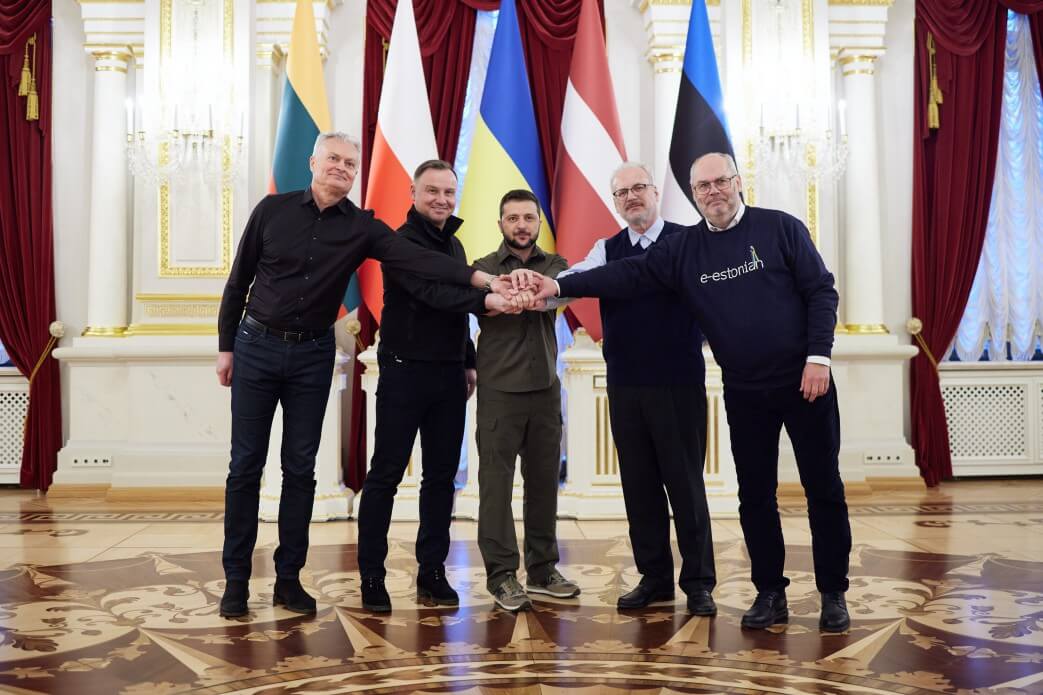On Wednesday, Ukrainian President Volodymyr Zelensky held a presidential meeting with his counterparts from Poland, Latvia, Lithuania, and Estonia—Andrzej Duda, Egils Levits, Gitanas Nausėda, and Alar Karis—in Kyiv to discuss military aid and post-war reconstruction.
The visiting presidents, who are all part of the European Union (EU) and North Atlantic Treaty Organization (NATO), first visited the recently-liberated towns of Bucha, Borodyanka, and Dmytrivka in the Kyiv region, where they witnessed the result of Russia’s military onslaught. Regarding their visit to the Kyiv suburbs, Zelensky said, “It is very important for them to see with their own eyes what happened in these small towns that were burned and tortured.”
Steinmeier not looking happy having received news of 🇺🇦 blocking trip:
— Thorsten Benner (@thorstenbenner) April 12, 2022
Says he wanted to send "strong signal of 🇪🇺 solidarity" alongside presidents of Baltics & Poland.
"I was ready but apparently (and I need to take note) this was not desired in Kyiv".pic.twitter.com/QRvXSBJkvU
Notably, German President Frank-Walter Steinmeier was absent from the visit, after announcing earlier that he will go to the Ukrainian capital in a display of solidarity. However, Berlin later stated that authorities in Ukraine told him that he was “not wanted” in Kyiv. This was described as “irksome” by German Chancellor Olaf Scholz. Zelensky, for his part, denied any of this happened; instead he said that the German government had not approached him in the first place. However, Ukraine has previously criticised Scholz for his “weak response to the [Ukraine] crisis.”
During his visit to Poland on Tuesday, the German President remarked that he had planned to travel to Ukraine with the presidents of Poland, Estonia, Latvia, and Lithuania but “that apparently wasn’t wanted in Kyiv.” Steinmeier’s comments come after the German newspaper Bild quoted a Ukrainian diplomat saying, “We all know of Steinmeier’s close relations with Russia here… He is not welcome in Kyiv at the moment. We will see whether that changes.”
President of Ukraine Volodymyr Zelensky has met with President of Latvia Egils Levits, President of Lithuania Gitanas Nausėda, President of Estonia Alar Karis, and President of Poland Andrzej Duda. The meeting took place in Kyiv pic.twitter.com/VpxhhEqXVX
— Hromadske Int. (@Hromadske) April 13, 2022
Later, in a joint press conference with the five presidents, Zelensky hailed their visit by saying that their countries were the first to support Ukraine after Russia’s invasion and first to back Kyiv’s EU ambitions. He also thanked Poland and the Baltic states for trailblazing a “strong sanctions policy” against Russia that was eventually followed by other European countries.
Poland’s Duda noted the drastic ways in which the Ukrainian capital had changed since his last visit, which took place just a day before Russia began its invasion. “This is not war, this is terrorism,” he remarked, adding, “If someone sends aircraft and soldiers to bomb residential areas, to kill civilians, it is not war, but cruelty, banditry, terrorism.” In this regard, Duda affirmed that Warsaw will continue to urge international courts to hold Russia accountable for its actions.
Zelensky’s military requests from foreign governments, in English. Includes “tanks from the USA or Germany” and “military aircraft, must-have to de-block our cities”. pic.twitter.com/OVSwdKizIg
— Philip Crowther (@PhilipinDC) April 13, 2022
Lithuania’s Nausėda, meanwhile, commended the resilience shown by the Ukrainians, adding that Vilnius completely supports providing arms to Kyiv and imposing a blanket ban on Russian energy imports. Moreover, he announced that his government’s plans to establish a Ukrainian culture and education hub in their capital. Lithuania has also downgraded diplomatic relations with Russsia.
Estonia’s Karis committed to providing Ukraine with help in the field of digitisation both immediately and during the post-war period. Furthermore, Latvian President Levits affirmed that Riga will provide weapons to Kyiv, saying, “Ukraine is fighting for us, and it is our duty to help by all means.”
Presidents of Poland, Lithuania, Estonia and Latvia visited Borodyanka, a town of 12,000 people 40 kilometers northwest of Kyiv, that has suffered some of the worst destruction seen by any place in Russia’s war against Ukraine.
— The Kyiv Independent (@KyivIndependent) April 13, 2022
Photo: Kancelaria Prezydenta/Twitter pic.twitter.com/pIRzf9fOrb
Meanwhile, in a separate address, President Zelensky also mentioned that the Chief Prosecutor of the International Criminal Court (ICC), Karim Khan, visited Bucha and witnessed the aftermath of Russia’s war.
Last week, major European leaders, including British Prime Minister (PM) Boris Johnson and European Commission President Ursula von der Leyen, made visits to the Ukrainian capital. Austrian Chancellor Karl Nehammer also visited Kyiv this week, following which he flew to Moscow to meet with Vladimir Putin in what he said was a “tough” meeting that left him feeling “rather pessimistic.”

